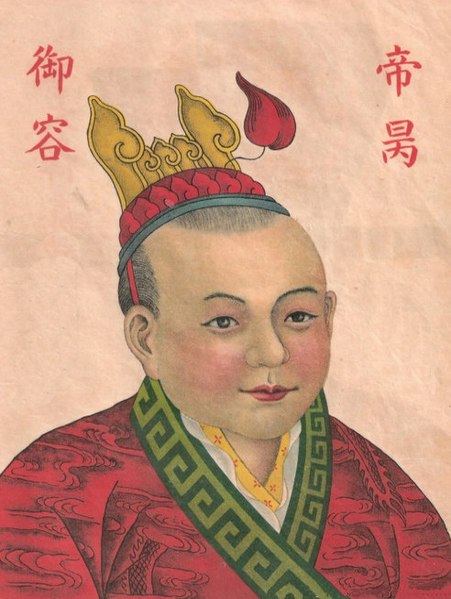
Image Source: Public Domain
About Emperor Bing
Lifespan: 1271 – 1279 A.D
Reign Years: 1278 – 1279 A.D
Given Name: Zhao Bing
Reign Name:

Image Source: Public Domain
Lifespan: 1271 – 1279 A.D
Reign Years: 1278 – 1279 A.D
Given Name: Zhao Bing
Reign Name:
The Song emperor Bing was the 18th and the last emperor of the Song Empire. He was also the 9th, as well as the last ruler of Southern Song. Bing of Song ruled from 1278 to 1279.
His rule ended when the Song Dynasty was completely defeated by the Yuan Dynasty during the Battle of Yamen.
Go back in time and follow the timeline and emperors of the Song Dynasty.
Read MoreThe Mongols sent General Zhang Hongfan to lead the attack against Zhao Bing and the remaining Song people. This led to the war at Yamen.
The Song army, which was led by Zhang Shijie, fiercely resisted and defended themselves against the Mongols. Unfortunately, they were eventually wiped out by the Mongols.
Around February 1276, Lin’an, capital of Song, was captured by the Mongol Empire’s army led by General Bayan. Emperor Gong was taken by the Mongols, yet his brothers Zhao Bing and Zhao Shi escaped to Southern China. They were able to flee due to the help of Yang Liangjie, Chen Yizhong, Lu Xiufu, and Wen Tianxiang.
They eventually reached Jinhua, where Zhao Shi became Grand Marshal, while Zhao Bing became Vice Grand Marshal. Eventually, Bing’s title was changed to the Prince of Wei.
In June of 1276, the 7-year-old Zhao Shi ascended the throne in Fuzhou and was crowned the new emperor. In history, he was known as the Emperor Duanzong.
Upon hearing this, General Bayan of the Mongols was set on eliminating the threat posed by the remaining Song. So, he led his troops to attack Southern China.
After the death of Emperor Duanzong in 1278, the morale of the Song army began dwindling. This led to most soldiers deserting the army.
Lu Xiufu then brought Zhao Bing to the area of Mei Wei in Guangzhou. It’s today’s Mui Wo, Lantau Island in Hong Kong. There, he was enthroned as Emperor Bing under the era named Xiangxing.
They also renamed Guangzhou to Xianglong County. After settling and preparing, Bing of Song and his army moved to Yamen to evade the Mongols’ attacks.
The Battle of Yamen, which was also called The Naval Battle of Mount Ya, occurred in March of 1279. It was considered as the final stand of the Song against the Yuan Dynasty. Despite being outnumbered, the Yuan army dealt a crushing and tactical attack, ultimately destroying the Song.
During this time, the army of the Song emperor prepared for little skirmishes. They didn’t expect a large attack from the Mongols.
With that, huge waves of arrows attacked the Song army’s ships. Since they were caught off-guard, they instantly lost seven ships, together with a large number of troops.
After killing the Song troops, the Mongols started their bloody slaughter of the Song court. Knowing that they lost the battle, Zhang Shijie chose his best soldiers then used a dozen ships from their formation. This was an attempt to break out and save the Bing Emperor.
Rare and unique Chinese antique blue and white porcelain Ming dynasty vase, the lower part of the vase is shaped as a big bowl decorate with foo dogs surrounded by clouds, in the center of the vase phoenix birds are painted in blue surrounded by peony blossom alternatively rendered and in profile.
Buy Now!Remarkable and rare made of high quality blue and white porcelain this dragon vase is from the early Ming dynasty, the vase is decorated with clouds and peony blossom and remarkable work of a dragon in clay. It has a long cover in perfect condition. The clay has a small chip near one of the dragon 3 claw hands
Buy Now!This antique blue and white porcelain plate features a beautiful and complex inverted painting with rich blue tone colors in the center, surrounded by a double ring peony blossom alternatively rendered and in profile, In the outer rim there is a painting in blue on white leaves surrounding the entire plate.
Buy Now!After realizing their loss in March of 1279, Lu Xiufu brought the 7-year old Bing of Song to a cliff. Together, they threw themselves into the sea, marking the end of the Song Dynasty.
The tomb of the Song emperor Zhao Bing can be located in today’s Chiwan in the Nanshan District of Shenzhen. It was rediscovered in the year 1960 and was restored and expanded in 1984.
After the demise of the Song Dynasty, Kublai Khan and those who succeeded him ruled China for 97 years. They stayed in power until the Ming Dynasty rose under the leadership of the Hongwu Emperor.
It was the time when the Chinese were able to regain control over the territories they lost from the Mongols.
This rare celadon jar from the ancient Song Dynasty features a beautiful all-olive green design, smooth and shiny, with a firm base from which grows an asymmetrically oval body with elegant grooved borders to a modest, slightly raised rim.
Buy Now!This rare preserved Song Dynasty celadon plate has a design devoid of decoration that makes it look like a beautiful, untouched piece of jade. Its bottom rests on a base that grows in layers around a small foot that grows along fine grooved borders.
Buy Now!This rare Song Dynasty ewer possesses an irresistible natural charm that exudes simplicity and grace in every part. It has an uncluttered base with a small foot that gives rise to a firm, sturdy body, devoid of any more decoration than a simple protruding medallion.
Buy Now!Join the VIP club, Get Auction notification, special offers and more!